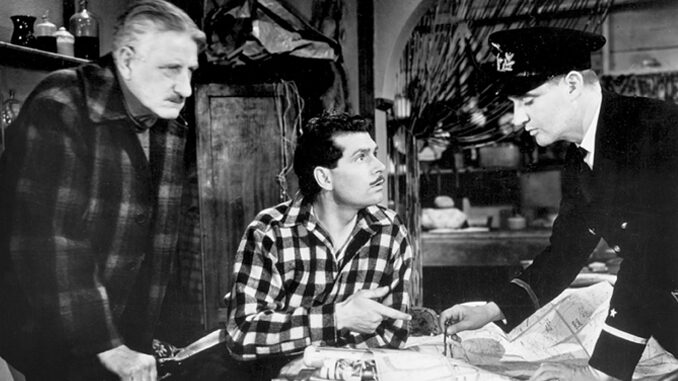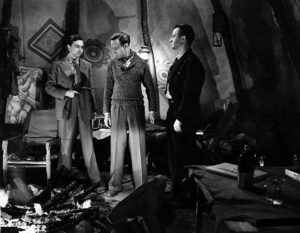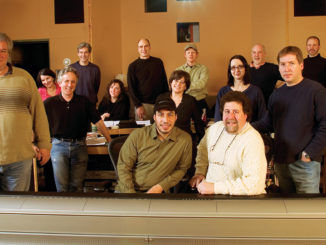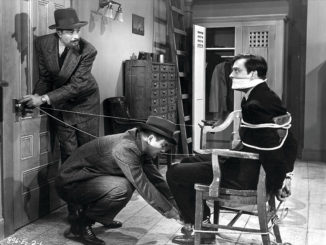
by Christopher Bomba
No matter how hardcore a cinephile you might be, there are always discoveries to be made in an old film never seen or even heard of. Long a fan of director Michael Powell and screenwriter Emeric Pressburger, I recently made such a find when I watched their 1941 wartime film 49th Parallel. No typical piece of World War II propaganda is it. The two men who, as the “Archers,” would go on to produce such classics as The Red Shoes and Black Narcissus, were already on their game. While primarily out to rally solidarity against the Nazi menace and encourage the United States to enter the war, they delivered a quirky, picaresque road-picture-with-bad-guys that’s as hilarious as it is dramatic, thought-provoking as it is suspenseful. In our day, when action and spectacle are so emphasized that character gets short shrift, there are lessons to be learned from these two masters. Even when the intent is agit-prop, a good story is always about its people.
The setup is a simple one. After sinking an oil tanker in the St. Lawrence Seaway, the crew of a German U-boat avoids Canadian defenses by sailing up into Hudson Bay. There, six sailors led by Lt. Hirth (played with Nazi exuberance by Eric Portman) are dispatched to raid a Hudson Bay Company trading post. This landing party is barely ashore when Canadian bombers sink the sub. Now stranded inside an enemy nation, the survivors begin a journey to reach the 49th parallel (the American-Canadian border) and find sanctuary in the still-neutral United States.
The odyssey of these hapless Germans — killed or captured one by one like Ten Little Indians — will take them from an Eskimo village across wheat-rich plains to an Indian pow wow in the stunning Canadian Rockies. But it will mainly consist of encounters with oddball characters that not only reflect Canada’s diversity, but its independent, freedom-loving spirit. The first is Johnnie, a French-Canadian trapper portrayed by Laurence Olivier with a deliciously over-the-top accent.Justin from a year in the wild, Johnnie is incredulous when the trading post factor (Finlay Currie) reveals that Canada is at war with Germany. Johnnie gives voice to isolationist sentiments understandable in a place so far removed from the insanity that has seized Europe. Yet, when the war literally steps through the door, he is the embodiment of defiance, standing up to the German invaders not just with courage, but sarcastic wit.
Wartime propaganda demands the audience be constantly reminded why the conflict is being fought. 49th Parallel is no exception; much dialogue is devoted to drawing the contrast between German fascism and Canadian democracy. But more often than not, these didactic moments are handled with humor. After getting the Nazis to confirm that they do indeed march with goosestep and raised arm, Johnnie playfully (and profoundly) asks: “Why?”
The gangster Germans are clearly the villains, yet their humanity is always in evidence — in terror as their stolen bush plane runs out of fuel, in hunger as flashing Winnipeg restaurant signs taunt with invitations to hamburgers and chops. Powell and Pressburger were accused of making the Nazis sympathetic. That’s going too far, but their antagonists are undeniably real people. This is perhaps most apparent when they come upon a colony of Hutterites, Amish-like religious socialists nominally led by the inscrutable Anton Walbrook. Consisting of German immigrants, this community is a microcosm of the nation to which so many Europeans escaped persecution. And it is here that crewman Vogel (Niall MacGinnis), an ambivalent Nazi whose eyes have opened to his country’s atrocities — and who just wants to bake bread — finds the freedom to rebel against the fanaticism of his shipmates.

The journey takes on an almost absurdist cast when, down to two, the Germans become the guests of a dandy Leslie Howard, a Blackfoot ethnographer with a Picasso and Matisse hanging in his teepee on an idyllic Rockies lakeside. Seeing Howard as the epitome of decadent cowardice, the Nazis once again underestimate their enemy, Howard getting the best of them and their bad manners.
Hirth ultimately finds himself alone and locked in a railroad freight car with Raymond Massey, a dementedly garrulous Canadian soldier overdue on leave and disgruntled that he is guarding the Chippewa canal (“Who’d want to steal it anyway?”) instead of fighting overseas. I won’t spoil the ending, but Powell and Pressburger direct the amusing climax squarely at the Americans in the audience, asking: Are you going to stay neutral? Or get in the fight?
Americans not only got in the fight, they honored 49th Parallel (released here as The Invaders) with three Oscar nominations (including Best Picture) and one win (Pressburger for Best Story). If you haven’t had the privilege, rent it from or stream it on Netflix. Even in its weak moments, it’s a movie that gets under your skin. By the way, the editor? Some guy named David Lean.





